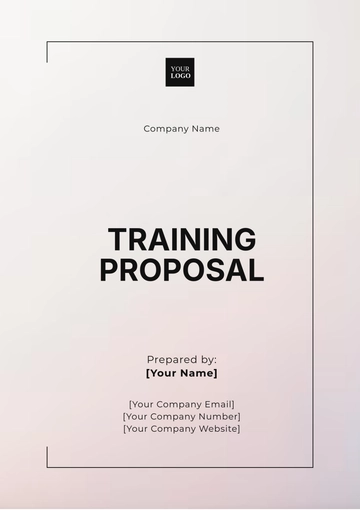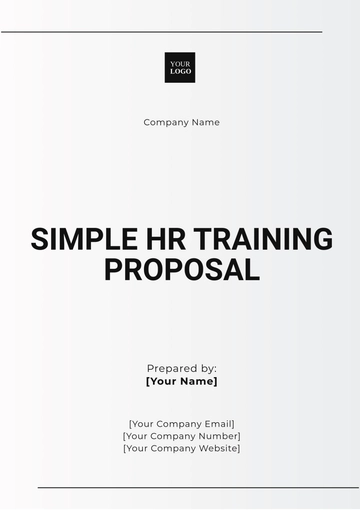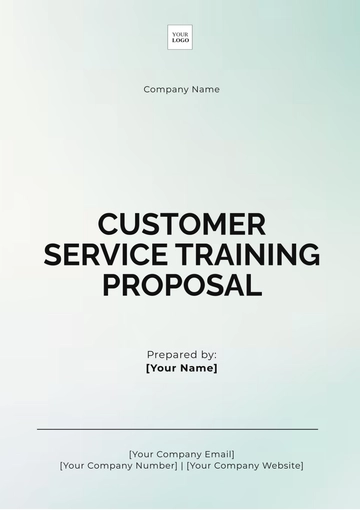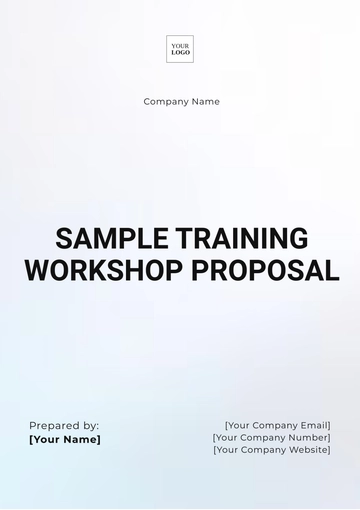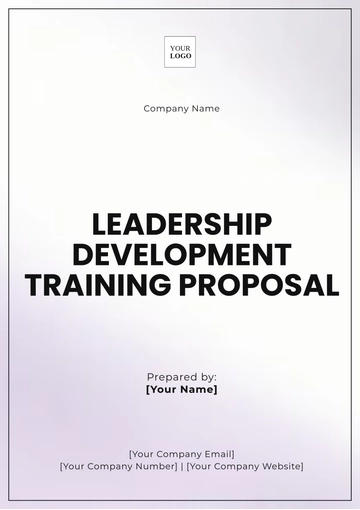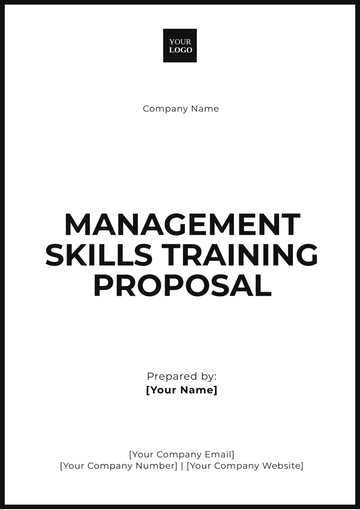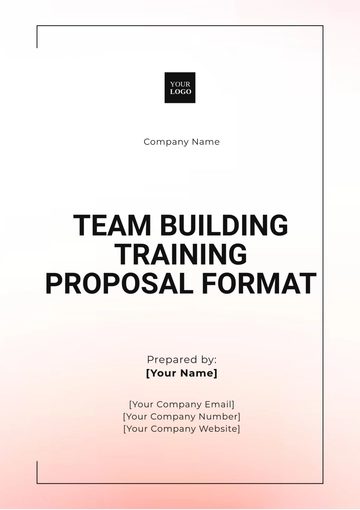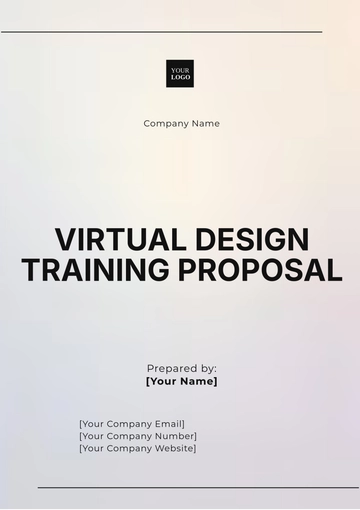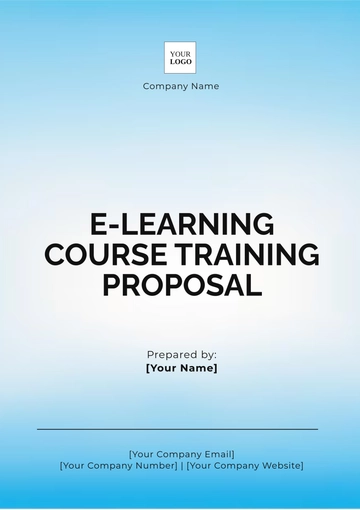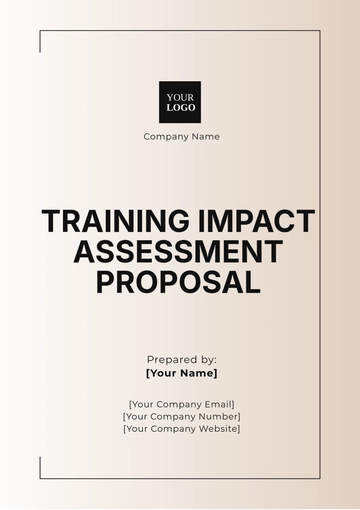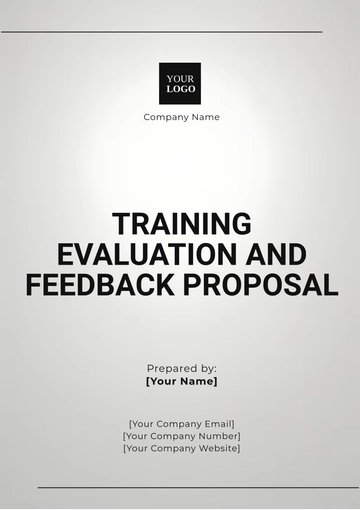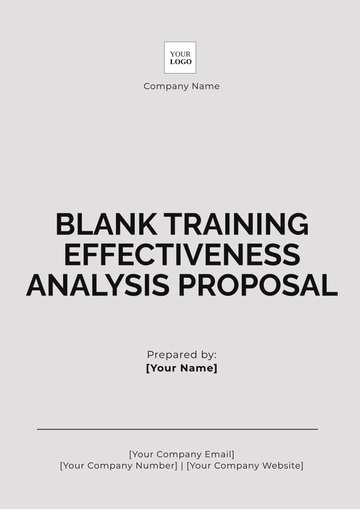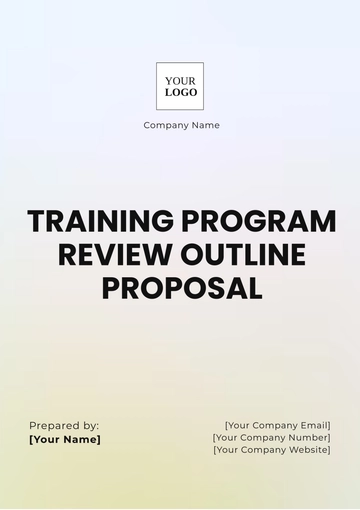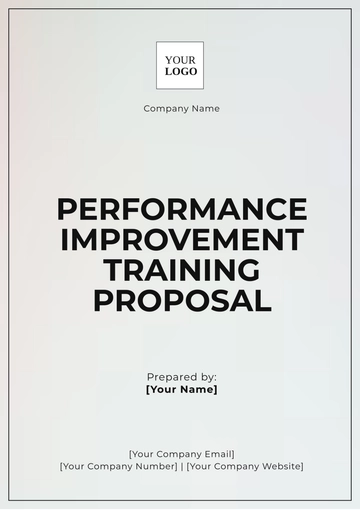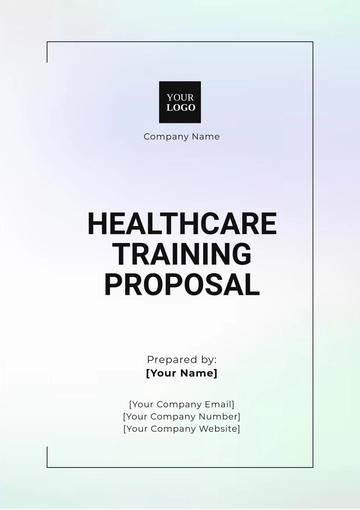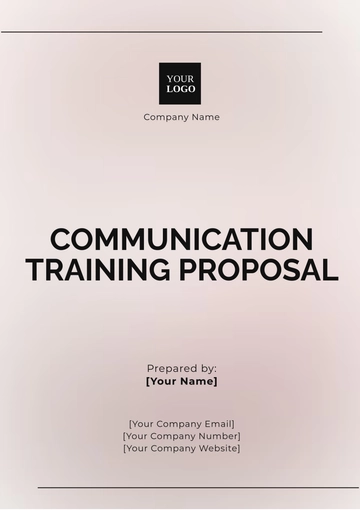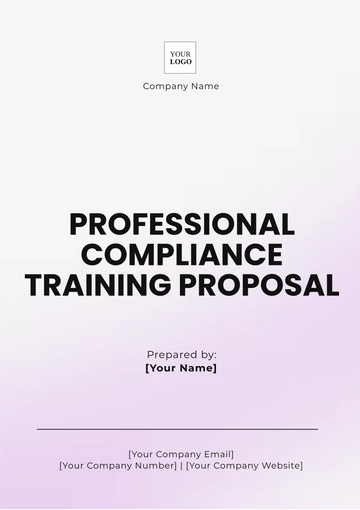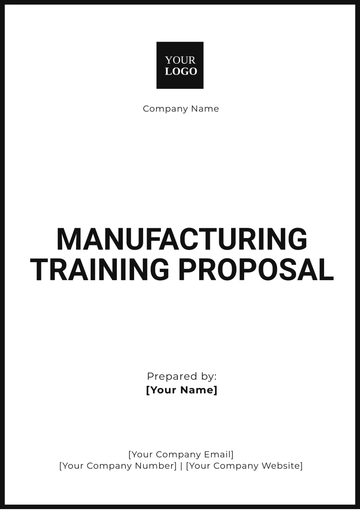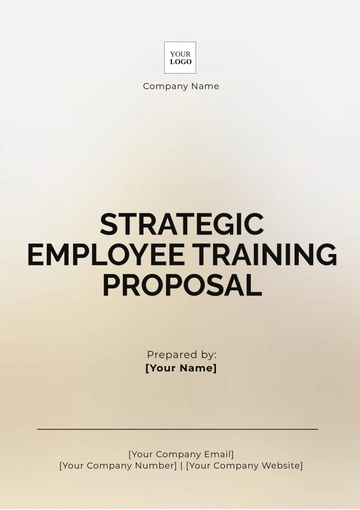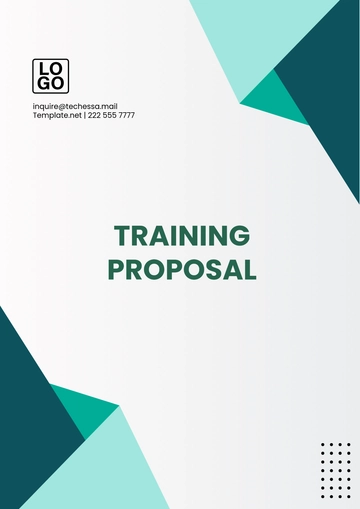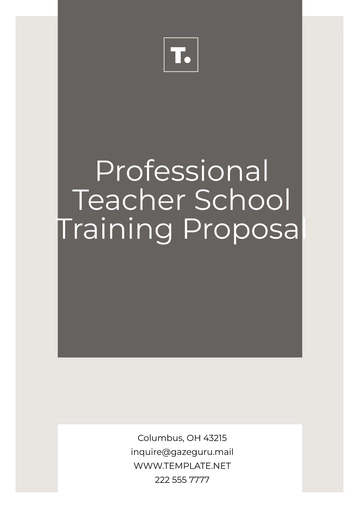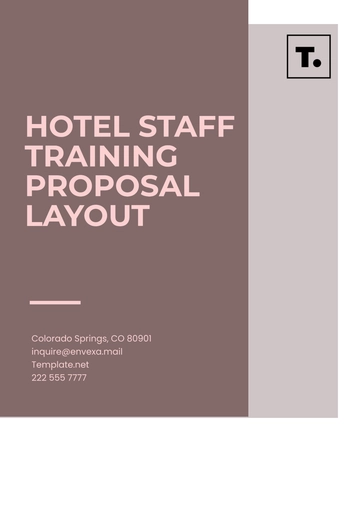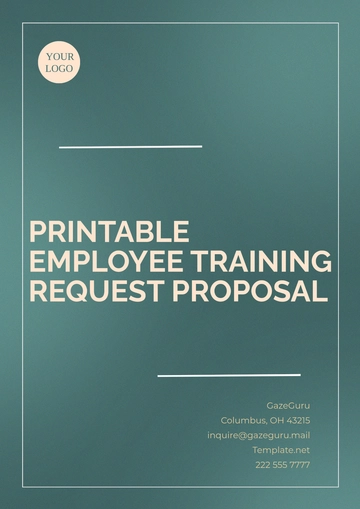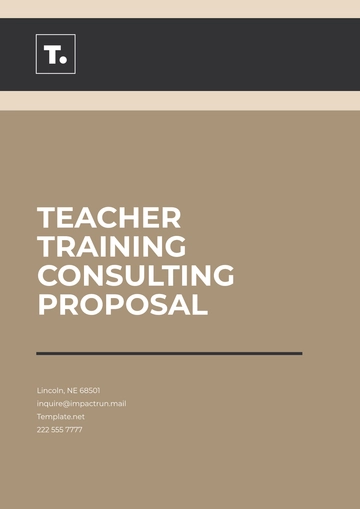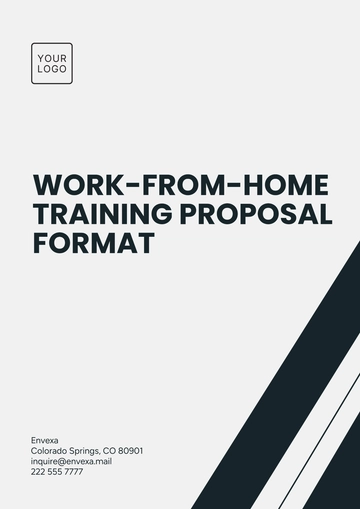Free Nursing Home Training Proposal
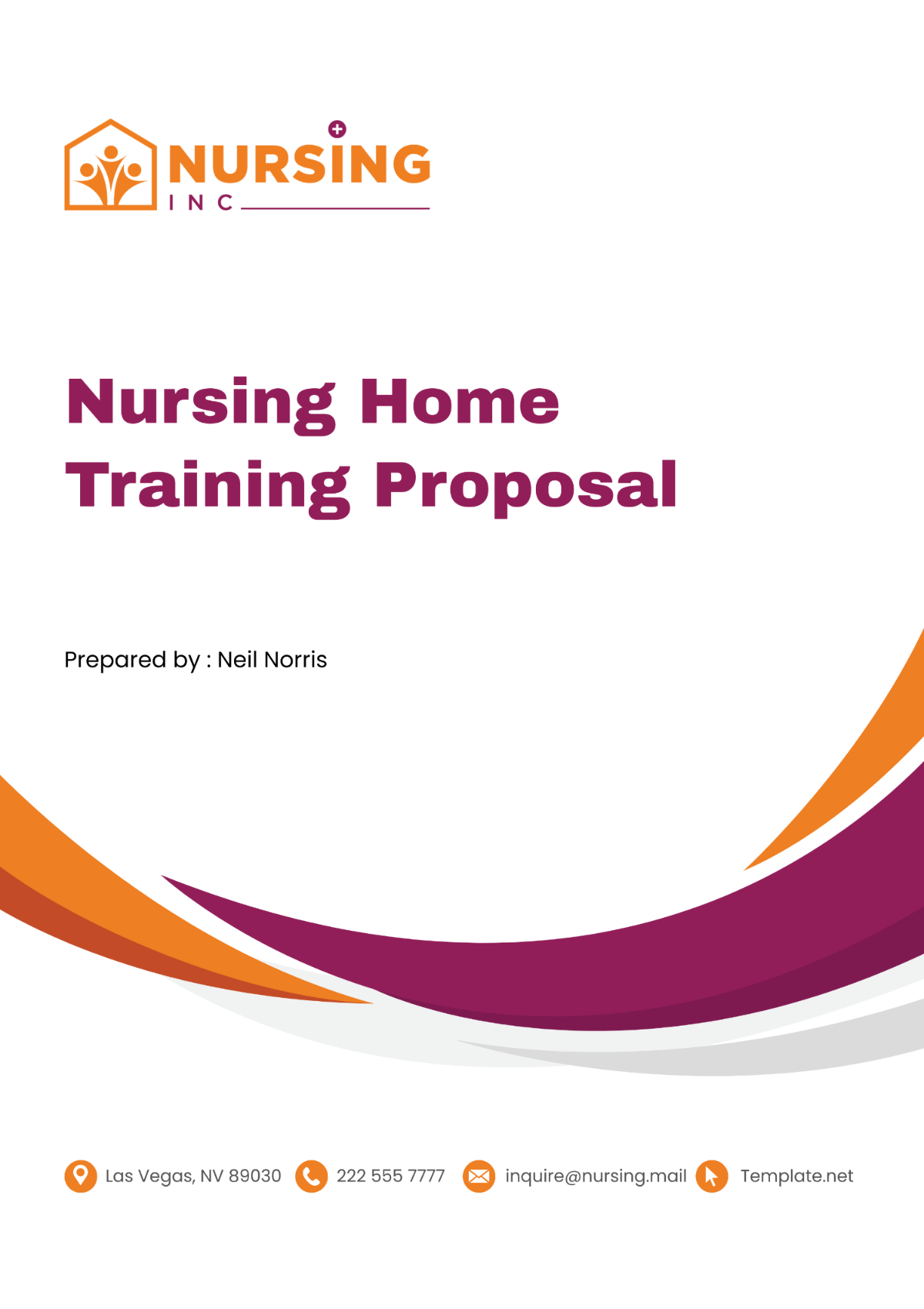
I. Executive Summary
This proposal outlines a comprehensive training program designed to enhance the skills and knowledge of our nursing home staff, ensuring the highest quality of care for our residents. Our commitment to continuous improvement and adherence to industry standards drives the need for a structured training initiative. The proposed program will address critical areas such as clinical competencies, resident safety, regulatory compliance, and personal development.
Key Objectives
To improve the quality of care provided to residents.
To ensure compliance with current healthcare regulations and standards.
To enhance staff confidence and competency in their respective roles.
To foster a culture of continuous learning and improvement.
Summary of Training Content and Structure
Clinical Skills Enhancement
Regulatory Compliance and Ethics
Safety Protocols
Personal Development
The training will be delivered through a mix of online modules, in-person workshops, and hands-on practice sessions, tailored to the learning needs of our diverse staff.
II. Introduction
In the ever-evolving field of healthcare, the importance of ongoing staff training cannot be overstated. For us, investing in our staff's professional development is not just a regulatory mandate but a core part of our mission to provide exceptional care to our residents. The proposed training program is designed to bridge existing knowledge gaps, improve the overall competency of our staff, and ensure that we continue to meet the needs and expectations of our residents and their families.
III. Program Objectives
The primary aim of our training program is to equip our nursing home staff with the necessary skills and knowledge to enhance the quality of care provided to our residents, ensuring a safe, efficient, and compassionate environment. This initiative is geared towards not only meeting regulatory compliance but also exceeding industry standards for resident care and safety.
Enhance clinical care skills to improve resident health outcomes.
Ensure full compliance with healthcare regulations and privacy laws.
Strengthen safety and emergency response protocols across the facility.
Promote a culture of respect, dignity, and ethical treatment of all residents.
Develop effective communication and teamwork among staff members.
IV. Needs Assessment
A thorough assessment of our current operations has highlighted several critical skill gaps within our staff that our training program aims to address. This analysis is instrumental in tailoring our training content to meet the specific needs of our team and ultimately improve the care provided to our residents.
Current Skill Gaps | Staff Affected |
|---|---|
Advanced Clinical Care | Nurses, CNAs |
Regulatory Compliance | Administrative Staff |
Safety and Emergency Response | All Staff |
Effective Communication | All Staff |
Ethical Care Practices | All Staff |
It's clear that our training program must align with both regulatory requirements and industry standards to be effective. Specifically, we need to ensure compliance with the Health Insurance Portability and Accountability Act (HIPAA) for privacy, the Occupational Safety and Health Administration (OSHA) guidelines for workplace safety, and the Centers for Medicare & Medicaid Services (CMS) regulations for nursing home operations.
Additionally, our training must incorporate best practices for geriatric care and dementia support, as recommended by leading healthcare organizations. By addressing these skill gaps with targeted training, we can not only meet but exceed these regulatory and industry benchmarks, ensuring our staff is well-prepared to provide the highest level of care and support to our residents.
V. Proposed Training Program
A. Training Content
The proposed training program encompasses a wide range of topics designed to address the identified skill gaps and ensure comprehensive coverage of all aspects of nursing home care and operations. The content will include advanced clinical care techniques to enhance resident health outcomes, comprehensive reviews of regulatory compliance to ensure adherence to healthcare laws, practical exercises in safety and emergency response, and workshops aimed at improving communication and ethical care practices. By integrating theory with practical application, the program aims to foster a deeper understanding and proficiency across all staff levels.
B. Target Audience
The training program is structured to cater to the diverse roles within our nursing home, ensuring that each staff member receives relevant and role-specific education.
Training Module | Duration | Format | Target Audience |
|---|---|---|---|
Advanced Clinical Care | In-person | Nurses, CNAs | |
Regulatory Compliance | Online | Administrative Staff | |
Emergency Response | In-person | All Staff | |
Effective Communication | Workshop | All Staff | |
Ethical Care Practices | In-person | All Staff |
C. Training Schedule
The scheduling of each training module will be designed to minimize disruption to our daily operations, ensuring that all staff have access to the necessary training without compromising the quality of resident care.
Training Module | Date |
|---|---|
Advanced Clinical Care | |
Regulatory Compliance | |
Safety and Emergency Response | |
Effective Communication | |
Ethical Care Practices |
VI. Resources Required
A. Trainers and Qualifications
Selecting highly qualified trainers is crucial for the success of our training program. Each trainer will be chosen based on their expertise in the specific subject matter and their ability to engage and educate adult learners effectively.
Trainer | Qty. | Qualification |
|---|---|---|
Clinical Care Specialist | RN, BSN, MSN | |
Compliance Expert | JD, Compliance Officer | |
Safety Coordinator | Certified Safety Professional | |
Communication Coach | Certified in Communication Training | |
Ethics in Healthcare | MA in Ethics, Healthcare Experience |
B. Materials and Equipment
The training program will utilize a variety of materials and equipment to facilitate an effective learning environment.
Projectors and screens for presentations
Computers and access to online training modules
Printed training manuals and handouts
Simulation equipment for hands-on training in clinical care and emergency response
C. Budget Estimation
A preliminary budget will be outlined to cover the costs associated with the trainers, materials, and any other resources required for the training program. This will ensure that the program is financially viable and provides a clear overview of the investment needed to enhance our staff's capabilities.
Item | Costs |
|---|---|
Trainer Fees | |
Materials and Equipment | |
Venue Rental (if applicable) | |
Miscellaneous Expenses |
VII. Implementation Plan
To ensure the successful rollout of the proposed training program, a detailed implementation plan has been developed. This plan outlines the key steps, timelines, and responsibilities associated with executing the training initiative, ensuring that all logistical and operational considerations are addressed efficiently and effectively.
Step | Timeline | Responsibility |
|---|---|---|
Finalize training content and materials. | Training Coordinator | |
Schedule training sessions and notify staff. | Department Heads | |
Coordinate logistics | Administrative Staff | |
Conduct training sessions. | Trainers | |
Gather immediate feedback post-training. | Training Coordinator | |
Monitor application of skills and knowledge. | Supervisors | |
Conduct follow-up evaluation. | QA Team |
VIII. Evaluation and Feedback
The effectiveness of the training program will be evaluated using a combination of quantitative and qualitative metrics to assess the impact on staff performance and resident care quality.
Metric | Target Values |
|---|---|
Knowledge Retention | ≥ 80% on Post-Tests |
Skill Application | ≥ 75% in Practical Assessments |
Staff Satisfaction | ≥ 85% Positive Feedback |
Resident Care Improvement | Measurable Improvement in Care Quality Indicators |
Compliance Rate | 100% for Mandatory Training |
The assessment will be undertaken through a variety of methods, including post-training tests to measure knowledge retention, practical assessments for skill application, and surveys for staff satisfaction. Additionally, key performance indicators related to resident care will be monitored to gauge the direct impact of the training on service quality. This multi-faceted approach allows for a comprehensive evaluation of the training program's effectiveness, informing future improvements and adjustments.
IX. Conclusion
The implementation of this training program represents a significant step forward in our commitment to excellence in resident care and staff development. By addressing key skill gaps and enhancing our team's capabilities, we expect to see measurable improvements in the quality of care provided to our residents, increased staff satisfaction and retention, and full compliance with regulatory standards. We call on all stakeholders to support this vital initiative, recognizing the invaluable investment in our staff's professional growth and our organization's long-term success. Together, we can achieve our goal of setting a new standard for quality and compassion in nursing home care.
- 100% Customizable, free editor
- Access 1 Million+ Templates, photo’s & graphics
- Download or share as a template
- Click and replace photos, graphics, text, backgrounds
- Resize, crop, AI write & more
- Access advanced editor
Unveil the potential of your care team with the Nursing Home Training Proposal Template from Template.net. This editable and customizable template is designed to outline effective training programs, ensuring each aspect is tailored to your needs. Streamline your training initiatives with ease, thanks to being editable in our AI Editor tool, and elevate your team's performance.
You may also like
- Business Proposal
- Research Proposal
- Proposal Request
- Project Proposal
- Grant Proposal
- Photography Proposal
- Job Proposal
- Budget Proposal
- Marketing Proposal
- Branding Proposal
- Advertising Proposal
- Sales Proposal
- Startup Proposal
- Event Proposal
- Creative Proposal
- Restaurant Proposal
- Blank Proposal
- One Page Proposal
- Proposal Report
- IT Proposal
- Non Profit Proposal
- Training Proposal
- Construction Proposal
- School Proposal
- Cleaning Proposal
- Contract Proposal
- HR Proposal
- Travel Agency Proposal
- Small Business Proposal
- Investment Proposal
- Bid Proposal
- Retail Business Proposal
- Sponsorship Proposal
- Academic Proposal
- Partnership Proposal
- Work Proposal
- Agency Proposal
- University Proposal
- Accounting Proposal
- Real Estate Proposal
- Hotel Proposal
- Product Proposal
- Advertising Agency Proposal
- Development Proposal
- Loan Proposal
- Website Proposal
- Nursing Home Proposal
- Financial Proposal
- Salon Proposal
- Freelancer Proposal
- Funding Proposal
- Work from Home Proposal
- Company Proposal
- Consulting Proposal
- Educational Proposal
- Construction Bid Proposal
- Interior Design Proposal
- New Product Proposal
- Sports Proposal
- Corporate Proposal
- Food Proposal
- Property Proposal
- Maintenance Proposal
- Purchase Proposal
- Rental Proposal
- Recruitment Proposal
- Social Media Proposal
- Travel Proposal
- Trip Proposal
- Software Proposal
- Conference Proposal
- Graphic Design Proposal
- Law Firm Proposal
- Medical Proposal
- Music Proposal
- Pricing Proposal
- SEO Proposal
- Strategy Proposal
- Technical Proposal
- Coaching Proposal
- Ecommerce Proposal
- Fundraising Proposal
- Landscaping Proposal
- Charity Proposal
- Contractor Proposal
- Exhibition Proposal
- Art Proposal
- Mobile Proposal
- Equipment Proposal
- Student Proposal
- Engineering Proposal
- Business Proposal
